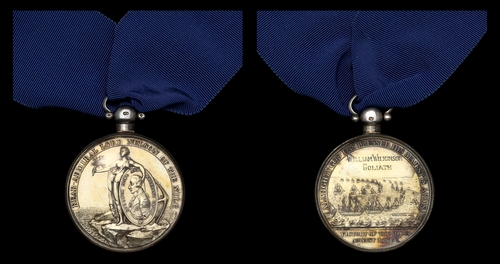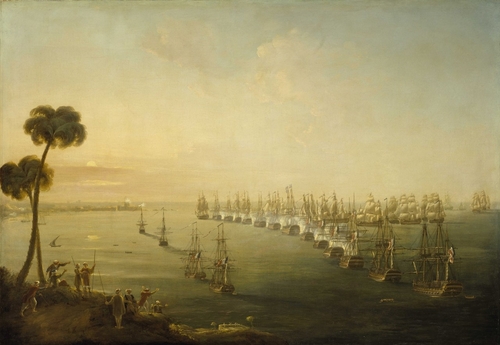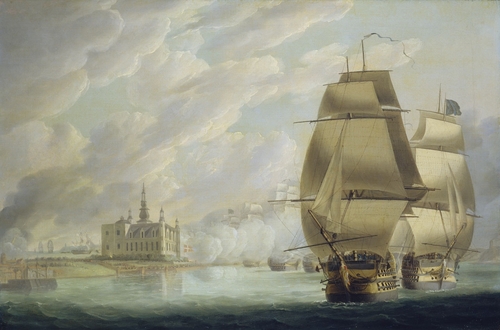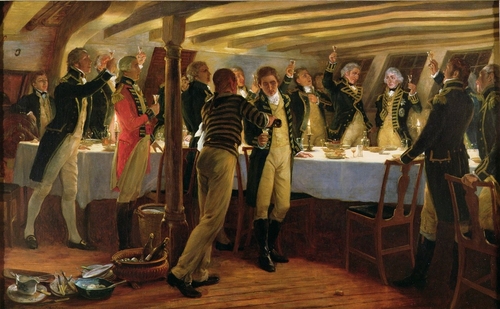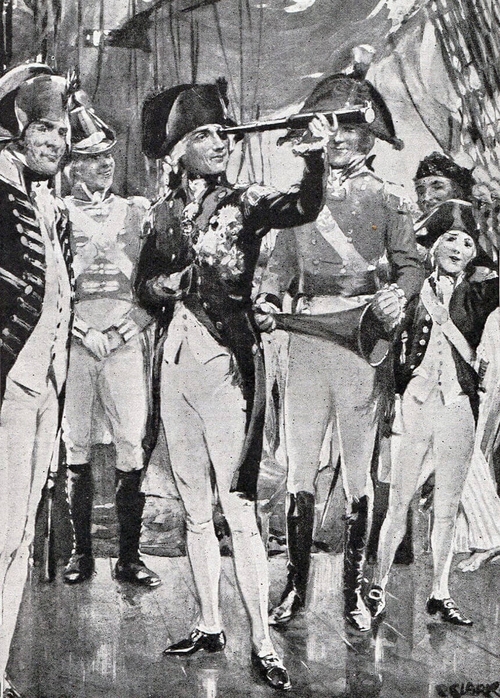Auction: 25003 - Orders, Decorations and Medals
Lot: 76
(x) The superb Alexander Davison's Medal for the Nile in silver awarded to Captain W. Wilkinson, who served as a Lieutenant aboard H.M.S. Goliath and was severely wounded during that great action in Aboukir Bay: he was shortly afterwards First Lieutenant aboard H.M.S. Elephant at the Battle of Copenhagen, and therefore surely bore witness to Admiral Nelson's famous act of raising his telescope to his blind eye rather than call off the engagement
Alexander Davison's Medal for the Nile 1798, silver, attractively and contemporarily engraved in block capitals to the reverse field William Wilkinson Goliath, contained within a silver case with glazed lunettes, hallmarks for Birmingham (date letter absent), about extremely fine
William Wilkinson was born at Felton, Northumberland, in January 1761 and though little is immediately known about his early life he received his commission as a Lieutenant in the Royal Navy on 29 April 1797 - though it is noted that a year earlier he had been placed in command of the 16-gun former French corvette H.M.S. Sardine, which had been captured on 9 March 1796. Removed shortly afterwards to the 74-gun H.M.S. Goliath, then under the command of Captain Thomas Foley (later Admiral Sir Thomas, G.C.B.) as one of his lieutenants, Foley, Wilkinson, and the men of Goliath were soon to play a crucial part in the famous Battle of the Nile.
On 1 August 1798 Admiral Nelson's British fleet of 14 ships of the line finally located Vice-Admiral Francois-Paul Brueys D'Aigalliers's French fleet - comprising 13 ships of the line and four frigates - anchored in a defensive position in Aboukir Bay, broadside-on to the open sea and using the shallow coastal waters of the bay as an additional deterrent to any offensive manoeuvres. This, however, did not deter Nelson's plan of attack and by 6 p.m. his fleet, in line of battle, bore down on their opponents with Goliath in the lead - in a race to be first to engage the enemy, she had just beaten H.M.S. Zealous to pole position. Initially, the plan was to sail down the outside of the French line and engage broadside-to-broadside in the traditional manner - however, as his ship got closer (ignoring long-range fire from a fort ashore and the 74-gun Guerrier) Foley noticed an unusually large gap between this first French vessel and the shore. Taking matters into his own hands he surmised there was enough room to cross ahead of Guerrier and engage the enemy on their unprepared port side. No doubt Lieutenant Wilkinson and his men were impressed by their quick-thinking, decisive and gallant captain's appraisal of the situation. As Goliath passed across Guerrier's bows, the well-trained British crew unleashed a devastating double-shotted broadside which raked the French ship from stem to stern and inflicted horrendous casualties: then passing inside the enemy's defensive line, the men of Goliath continued firing as fast as they could into each French vessel in turn. Foley had originally planned to anchor next to Guerrier finish her off, but her anchor took too long to lower and so she eventually stopped between Conquerant and Spartiate, second and third respectively in the French line. Goliath had been followed by several other British ships (Zealous, Audacious, Orion and Theseus) and Guerrier bore the brunt of every first broadside: within five minutes her foremast had gone over the side and by the end of the battle she had suffered almost 400 casualties. However, as the first British vessel to engage the enemy and taking on at least three French '74's' Goliath suffered too - by the end of the engagement her 'butcher's bill' totalled 21 killed and 41 wounded, the latter including Wilkinson who was hit in both the head and chest over the course of the battle and must therefore have been in a position of some prominence. From then on, Captain Foley became known both as the "Hero of the Battle of the Nile" and one of Nelson's famous "Band of Brothers", and further received a very well-deserved small Naval Gold Medal.
Fortunately, despite multiple wounds Wilkinson does not appear to have been incapacitated for very long as upon the return home from Egypt he was appointed First Lieutenant of Goliath - indeed, an interesting letter held in The National Archives (T.N.A.) at Kew notes that when she was at Portsmouth and Foley was ashore, Wilkinson had temporary command of Goliath and detained a wherry and its' crew which attempted to assist members of the battleship's crew to abscond ashore. This led the wherrymen to bring about a prosecution against Wilkinson - who, however, had the full support of Foley as a steady officer 'acting for the good of the service.' (ADM 1/1799/58, refers).
Captain Foley clearly thought very highly of his subordinate as they were to serve together for a number of subsequent years: when he was given command of the 74-gun H.M.S. Elephant, Wilkinson was appointed First Lieutenant; after a period of service on the Brest blockade Foley was given orders to join the fleet under Admiral Sir Hyde Parker for the Expedition to Copenhagen, with the newly-promoted Vice-Admiral Nelson as second-in-command. The reasons for the Battle of Copenhagen (and indeed the Second Battle of Copenhagen six years later) are mired in controversy and essentially occurred due to a breakdown in diplomatic relations between Britain and Denmark, and a British fear that the potentially powerful Danish fleet would side with France to fight against the Royal Navy. On 30 March 1801, Parker's fleet (with Elephant second in line) sailed through the narrows between Denmark and Sweden (under fire from the former but fortunately not from the latter) and the same day Nelson reconnoitred the Danish defences around Copenhagen harbour - not only were the shore batteries extremely strong and the ships prepared for action, but the British possessed no reliable charts and the area was known to be full of dangerous shoals unsuitable for large warships. Nelson therefore transferred his command from the large 98-gun H.M.S. St. George to the shallower-draft Elephant, and was subsequently reunited with his Nile 'shipmates' Foley and Wilkinson for the main attack, which Parker had delegated to his subordinate.
Nelson's command slowly sailed through the shoals, but very quickly things began to go wrong when three of his 74-gun vessels (Agamemnon, Russell and Bellona) ran aground before coming into contact with the Danes; this weakened the attack and caused some hurried changes in the line of battle. The Danish batteries commenced firing at 10.05 a.m. and by 11.30 a.m. the action began in earnest, with the British ships encountering heavy resistance due to the sheer number of batteries and ships manned by their courageous opponents.
At 1 p.m. the battle was still raging and Admiral Parker could not see much of the battle due to the dense clouds of gun smoke - but could see the three stranded British ships and feared that Nelson's force was in danger of being destroyed. 30 minutes later he remarked to his Flag Captain: "I will make the signal of recall for Nelson's sake. If he is in condition to continue the action, he will disregard it; if he is not, it will be an excuse for his retreat and no blame can be imputed to him." At this, Nelson acknowledged the signal but now make his famous remark to Captain Foley, raising his telescope to his blind eye: "You know, Foley, I only have one eye - I have the right to be blind sometimes. I really do not see the signal!" Perhaps Wilkinson too witnessed this act which has subsequently gone down in history and shared a smile with Foley and Nelson on the quarterdeck of the Elephant.
Eventually superior British training and gunnery took such a heavy toll on the Danish ships and defences that the battle swung decisively in favour of Admiral Parker; by 2 p.m. much of the enemy line had fallen silent and by 4 p.m. a ceasefire was agreed. Danish losses amounted to between 1,600 - 1,800 men killed, wounded or captured; one ship exploded, two ships sunk, and 12 captured - British losses were 963 men killed and wounded, with no ships permanently disabled despite the unfortunate groundings. Wilkinson had survived another major action, and with it came a well-deserved promotion: 'Lieut. W. Wilkinson, first of the Elephant, in consequence of his officer-like conduct in the action off Copenhagen, is promoted to the rank of commander, and appointed to the Holstein, of 64 guns. This is the gentleman who was so severely wounded in the head and chest, in the ever memorable battle of the Nile. He was then a lieutenant on board the Goliath, Captain Foley.' (Hampshire Chronicle, 'Home News', Portsmouth, 27 April 1801, refers). It is surely a measure of his significant standing amongst his superiors that he was given command of the Holstein, as she was the only Danish vessel subsequently taken into British service after the Battle of Copenhagen: the rest were all burned.
From May 1803 to October 1805, he had command of the former 44-gun H.M.S. Gorgon, by that time serving as a guardship on the Irish station, specifically on the River Shannon. On August 1805 he was appointed to command the 16-gun brig-sloop H.M.S. Nightingale, taking her back to the North Sea and over the next five years had an extremely active war, capturing a large number of Danish and Prussian ships and was even present at Copenhagen in 1807 for the Second Battle - familiar territory indeed, though commanding such a small vessel meant no participation in the bombardment, as he had done six years earlier. On 21 October 1810 (the fifth anniversary of Trafalgar), Wilkinson was promoted to Captain; it appears that he was without a specific command for a few years but in 1813 given command of the 64-gun H.M.S. Monmouth, flagship of none other than Vice-Admiral Thomas Foley, Commander-in-Chief of the Downs station - it is surely no accident that Foley and Wilkinson were reunited in service, Foley likely requesting the services of his able and reliable subordinate once again. Monmouth was laid up at Woolwich in 1815, and from then on Captain Wilkinson disappears from history: it is known that he married one Alice Foreman, of Longhoughton, Northumberland, on 1 July 1785 and had issue of one son, Thomas, but as Wilkinson's name does not appear on the roll for the Naval General Service Medal it is presumed he died prior to 1847.
Sold together with a small amount of copied research.
Subject to 5% tax on Hammer Price in addition to 20% VAT on Buyer’s Premium.
Sold for
£2,600
Starting price
£1600

